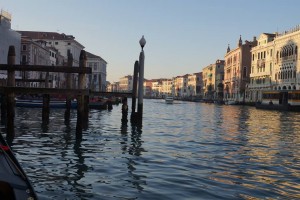
It was all feeling a little Dan Brown to me.
I had spent years researching the rumors that Marco’s Last Will and Testament was housed in a vault in the Museo Correr in Venice, Italy. Now, a call from my Italian contacts — some in high political places — was telling me that there was no record of such a document. And if there had been, it had gone missing. No one in Venice, my contacts told me, knew anything.
Look, I said: “I know, for a fact, that a pair of modern-day explorers got to privately view it back in the 90’s. I know it’s in Venice. Somewhere.” Niente, they said. It does not exist. Now, keep in mind, I once had the manager of an elite Venice hotel try to tell me that Marco Polo, himself, did not exist (!)

So what a thrill it was when the call did eventually come, to tell me that the ancient parchment had been located — now moved to a vault in one of the world’s earliest surviving manuscript depositories, in St. Mark’s Square Venice.
It would require a formal letter from me to the curator, expressing my passion and interest as a historian and filmmaker, and then a set appointment allowing a 30-day advance notice so that the climate-control could be carefully prepared at the archive — otherwise the 14th century parchment could disintegrate. What you’re about to view here is the ACTUAL PARCHMENT, the authentic document (handled only by an archivist in white gloves).
Join Marco Polo actor Lorenzo Richelmy and I as we get to view the “lost” Will and Testament of Marco Polo. Although his last words were reputed to be “I have not told half of what I saw” (when asked to recant his incredible tales about Asia), what you will read, along with us in English from the Latin, are among Marco’s last words and wishes — and they hold a few surprises about what he brought back with him from the Court of Kublai Khan, including a Mongol servant — likely given to him by the Khan — whom Marco would later grant official release from service and a financial stipend to live a free life in his own home in Venice.









